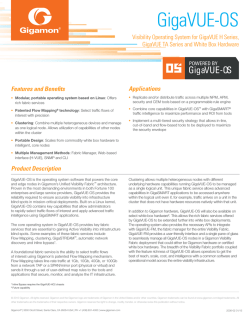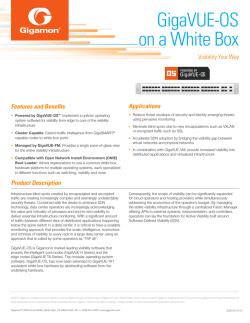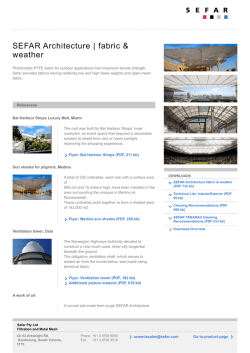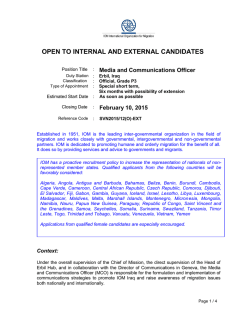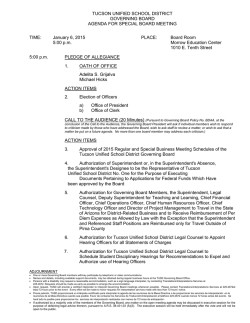
Unified Visibility Fabric Download Solution Brief
UNIFIED VISIBILITY FABRIC //Solution Brief We live in an era where business and society are embracing lifestyles that are enhanced and enabled through access to networks at home, at work and while on the move. As a result there is a global dependency upon the communication and information that traverses these networks—from social media messages to trading transactions, from medical health records to lectures delivered by video. The challenges of operating and managing networks have fundamentally changed. Driving Forces Affecting Network Infrastructure Virtualization, cloud computing, mobility, and big data are powerful forces that are not only driving opportunities to improve business, but also creating and extenuating significant challenges and opportunities in how organizations manage, analyze, and secure their networks. These include: •Managing increased network traffic volumes •Maintaining infrastructure security and compliance Legacy Approaches to Traffic Visibility IT organizations have historically had access to a limited range of approaches to address traffic visibility. Legacy approaches have included: wide-spread proliferation of tools, repurposing Ethernet switches, the use of mirror ports to duplicate traffic, and the division of traffic flows via network TAPs. However, these approaches fail to address the challenges faced by network owners—offering only limited filtering capabilities and visibility from a single switch, network segment, or TAP. In addition, these approaches are difficult and costly to scale and manage, often requiring change orders or network downtime in order to adapt to events occurring within the evolving network. Given the performance limitations, cost and complexity of legacy approaches, organizations struggle to scale and ensure the performance, reliability, and integrity of their network infrastructure. •Addressing the proliferation of connected devices A New Approach to Traffic Visibility is Needed •Embracing the consumerization of IT At Gigamon we realized that delivering the visibility essential to operate, secure and maintain complex networks requires a new approach. With millions of traffic flows, thousands of events and hundreds of changes occurring within the infrastructure on a daily basis, visibility needs to be pervasive, it needs to intelligent, and it needs to be dynamic. It needs to be able to understand the criticality and priority of traffic and recognize when specific traffic is significant to more than just one management system. It needs to be able to see across the boundary of physical and virtual and into the cloud providing the clarity needed to secure, maintain, and support both physical and virtualized services and applications. •Adopting cloud-based IT Even though the environment is evolving, the need to provide an efficient, secure and reliable network remains. Need for a Comprehensive Visibility Solution Organizations are seeking to improve visibility and control of their networks through the collection and analysis of traffic without adversely impacting network performance or reliability. However, the process of capturing and analyzing network traffic is complex. It requires the extraction of the traffic, classification to determine appropriate priority of the traffic, and delivery to the relevant tool or tools that help manage, analyze, and secure the network. © 2012-2015 Gigamon. All rights reserved. 1 UNIFIED VISIBILITY FABRIC //Solution Brief Results of an independent survey of IT managers, conducted by the Enterprise Strategy Group highlight a variety of drivers that both identify the shortcomings of current alternatives and substantiate the need for a new approach (see Figure 1). The Gigamon Unified Visibility Fabric The Unified Visibility Fabric™ is an innovative and complete visibility solution to bridge communication networks. For truly pervasive visibility, this must include physical, virtual and emerging SDN/NFV environments. The Gigamon Unified Visibility Fabric is a layered architecture (see Figure 2) that includes the following tiers: •Visibility Fabric Nodes Tier •Fabric Services and Traffic Intelligence Tier •Fabric Control (Management) Tier •Application Tier Figure 1: Enterprise Strategy Group Results Figure 2: The Gigamon Unified Visibility Fabric © 2012-2015 Gigamon. All rights reserved. 2 UNIFIED VISIBILITY FABRIC //Solution Brief Visibility Fabric Nodes Tier Distributed nodes provide pervasive visibility across physical, virtual, and remote sites, as well as future SDN/NFV production networks. Gigamon provides the industry’s broadest portfolio of visibility nodes. These GigaVUE® fabric nodes include: •GigaVUE H Series forms the foundation of a distributed fabric. The high-performance fabric nodes are modular and extensible for a range of scale and performance requirements from 1Gb 1RU nodes to larger 2.4Tb chassis-based solutions. The GigaVUE-HB1 node is an ideal choice for space constrained locations, smaller sites, or remote sites where native GigaSMART® intelligence is required. •The GigaVUE TA Series forms the physical edge of the visibility infrastructure. Optionally, Gigamon’s market-leading software, GigaVUE-OS may also be used on white box hardware to economically extend reach into every rack of a mega data center. •GigaVUE-VM forms the virtual edge of the visibility infrastructure and extends visibility within virtual networks and monitors traffic between virtual machines. This will be particularly important in future NFV environments where critical components of the network infrastructure may be virtualized—maintaining accurate visibility in such a disaggregated environment is paramount. • In addition to the GigaVUE fabric nodes, TAPs provide non-intrusive access to (physical) traffic at various network interface speeds—1Gb (Copper or Fiber), 10Gb, 40Gb (including Cisco 40Gb BiDi) and 100Gb. TAPs could be active, passive or embedded and are offered for a variety of cable types and in a variety of split ratios. Together, the Visibility Fabric nodes provide traffic aggregation, filtering, replication, and intelligent packet and flow manipulation optimized for the tools that manage, analyze and secure the network. Dynamic changes can be made easily without impacting the production network so IT organizations can be agile and responsive to threats, events or anomalies on the network. Fabric Services and Traffic Intelligence Tier The Visibility Fabric nodes offer two distinct set of services, Fabric Services powered by GigaVUE-OS and Traffic Intelligence powered by GigaSMART: •Gigamon’s patented Flow Mapping® technology identifies and directs incoming traffic flows of interest to single or multiple tools based on user-defined rules implemented from a centralized management system. Flow Mapping allows multi-tenant access and segregation of monitored traffic and policies by providing advanced role-based management. •Clustering allows multiple GigaVUE nodes to be managed as a single logical entity. Traffic can enter one node and be directed out a different node as a single “logical chassis”. An important attribute of clustering is the ability to extend GigaSMART traffic intelligence to anywhere in the cluster. •Inline bypass bridges the performance gap between the network and critical security tools that need to be placed inline (e.g. Intrusion Protection Systems, Advanced Threat Protection security tools etc.). By applying intelligence such as application-aware bypass, traffic can be selectively distributed to such inline security tools. The bypass functions can either be logical or physical. Traffic Intelligence is powered by GigaSMART technology. GigaSMART provides stateful and packet-level optimization and normalization functions that run as software applications on high-performance compute engines in the fabric nodes. GigaSMART applications span a variety of functions and include: •Packet slicing/masking removes or changes confidential information in a packet before sending it to a monitoring tool •Header stripping removes extraneous headers to deliver normalized IP packets to monitoring tools. This is especially useful when adopting network virtualization or SDN •De-duplication eliminates duplicate instances of the same packet to avoid unnecessary traffic processing by tools •GTP (GPRS Tunneling Protocol) Correlation aligns traffic between user and data planes in 3G and 4G/LTE mobile networks •SSL Decryption applies keys to decrypt SSL traffic, offloading this function from the tools •NetFlow Generation creates NetFlow records from traffic fed to the Visibility Fabric •FlowVUE™ provides Subscriber-based IP sampling that enables existing tools to connect to high-speed traffic pipes by providing a representative view of traffic for diagnostic coverage Other applications are also available. Fabric Control (Management) Tier GigaVUE-FM (Fabric Manager) provides centralized management and a common policy framework for the Visibility Fabric. GigaVUE-FM delivers a single-pane-of-glass view of all the physical and virtual nodes across the Visibility Fabric, while also providing an easy-to-use wizard-based approach for configuring patented Flow Mapping and GigaSMART traffic policies. © 2012-2015 Gigamon. All rights reserved. 3 UNIFIED VISIBILITY FABRICE //Solution Brief In addition to centralized management and control, GigaVUE-FM features fabric-wide reporting, scheduling capabilities, backup and restore functions, and enhanced monitoring capabilities to proactively monitor and troubleshoot hot spots in the visibility infrastructure. As a future direction, the GigaVUE-FM solution will likely provide a set of REST APIs to integrate with third-party applications and tools to enable dynamic changes in the Visibility Fabric. Application Tier The Applications Tier interfaces with GigaVUE-FM, Fabric Manager through a set of forthcoming APIs. These APIs will allow third-party development of applications, integration with SDN controllers, integration with other specialized IT applications and tools infrastructure. The GigaVUE-FM features pre-integration with VMware vCenter APIs to track vMotion events across virtualized infrastructure—this integration allows continuous visibility without administrator intervention. Together, this framework allows an extensible environment for visibility into infrastructure blind spots and maximizes performance of the tool infrastructure. With a Unified Visibility Fabric in place, dynamic changes can easily be made to the flow of traffic without impacting the production network. As a result IT organizations can be agile and responsive when reacting to threats, events or anomalies on the network. By providing pervasive visibility and control, the Gigamon Visibility Fabric can: •Improve ROI—Control traffic to avoid oversubscription, extend the life of existing tools and ensure that the tools used to manage, analyze and secure the network receive the critical information they require to realize their full potential •Reduce Costs—Centralize tools into a “Unified Tool Rail” to reduce CAPEX; simplify management to reduce OPEX with a flexible policy engine that enables parallel monitoring policies to serve multiple departments simultaneously •Enable Scale—Invest in a solution that can grow to address future needs as your network grows from 1Gb to 10Gb, 40Gb or 100Gb, and evolves from physical to virtual to SDN and NFV environments To find out how a Gigamon Unified Visibility Fabric can help you, visit us at: www.gigamon.com © 2012-2015 Gigamon. All rights reserved. Gigamon and the Gigamon logo are trademarks of Gigamon in the United States and/or other countries. Gigamon trademarks can be found at www.gigamon.com/legal-trademarks. All other trademarks are the trademarks of their respective owners. Gigamon reserves the right to change, modify, transfer, or otherwise revise this publication without notice. Gigamon® | 3300 Olcott Street, Santa Clara, CA 95054 USA | PH +1 (408) 831-4000 | www.gigamon.com 3018-03 01/15
© Copyright 2026
